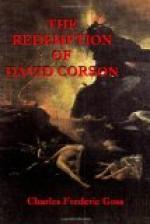For several years this Quaker youth had been the subject of remarkable emotional experiences, in explanation of which the rude wits of the village declared that he had been moon-struck; the young girls who adored his beauty thought he was in love, and the venerable fathers and mothers of this religious community believed that in him the scriptural prophecy, “Your young men shall see visions,” had been literally fulfilled. David Corson himself accepted the last explanation with unquestioning faith. He no more doubted the existence of a spiritual than of a material universe. He did not even conceive of their having well-defined boundaries, but seemed to himself to pass from one to the other as easily as across the lines of adjoining farms. In this respect he resembled many a normal youth, except that this impression had lingered with him a little longer than was usual; for faith is always instinctive, while skepticism is the result of experience and reflection. Having as yet only wandered around the edges of the sacred groves of wisdom where these pitiless teachers break the sweet shackles of their pupils, he still thought the thoughts of childhood and instinctively obeyed the injunction of Emerson, to “reverence the dreams of our youth,” and the admonition of Richter, that “when we cease to do so, then dies the man in us.” Whatever might have been the real nature of these emotional experiences, no one doubted that they possessed a genuine reality of some kind or other, for it was a matter of history in this little community that David Corson had often exercised prophetic, mesmeric and therapeutic powers.
The life of this young man had been pure and uneventful. Existence in this frontier region, once full of the tragedy of Indian warfare, had been gradually softened by peace and religion. The passions slowly kindling in the struggle over slavery had not yet burst into flame, and this particular valley was even more quiet than others because it had been settled by a colony of Quakers. Into it the rude noises of the great outside world floated only in softened echoes, and what knowledge young Corson had acquired of that vague and shadowy realm had come mainly through traveling preachers, and this, because of their simplicity and unworldliness, was not unlike hearing the crash of arms through silken portieres or seeing the flash of lightning through the stained-glass windows of a cathedral. In such a sequestered region books and papers were scarce, and he had access only to a few volumes written by quietists and mystics, and to that great mine of sacred literature, the Holy Bible. The seeds of knowledge sown by these books in the rich soil of this young heart were fertilized by the society of noble men, virtuous women, and natural surroundings of exquisite beauty.




